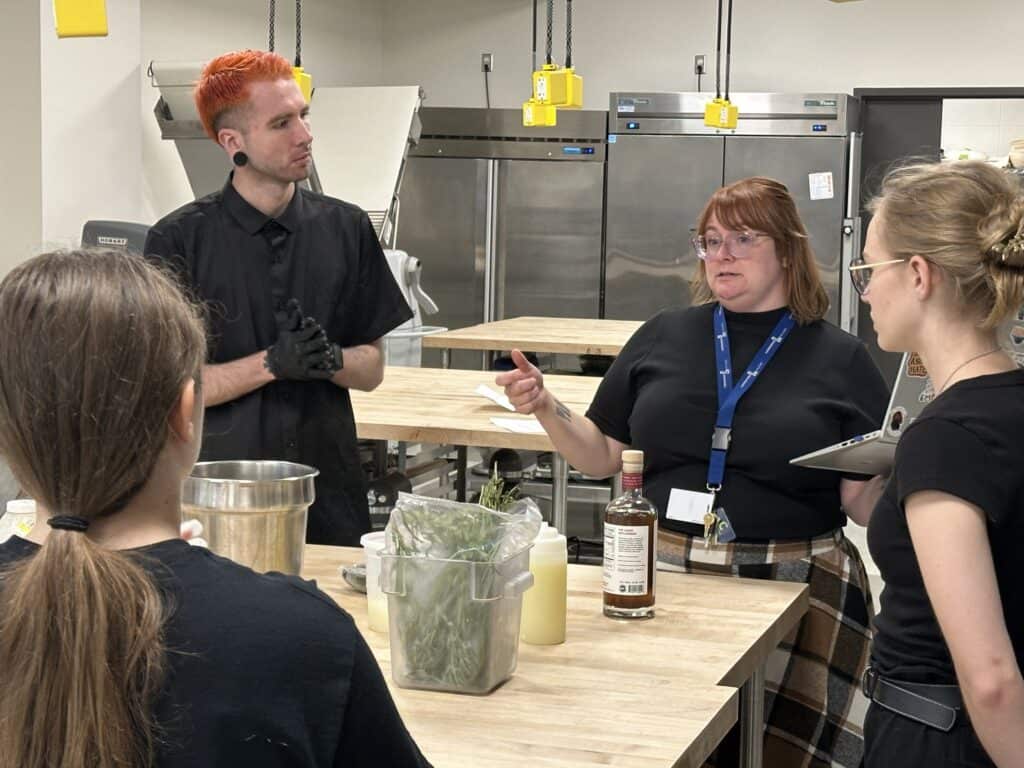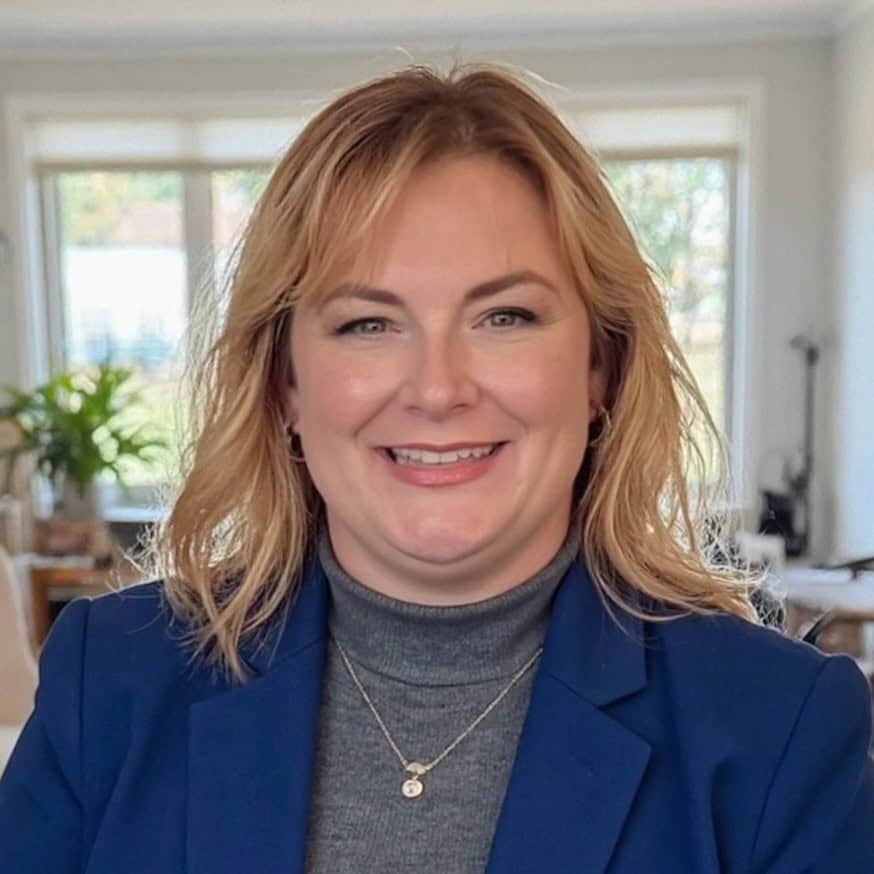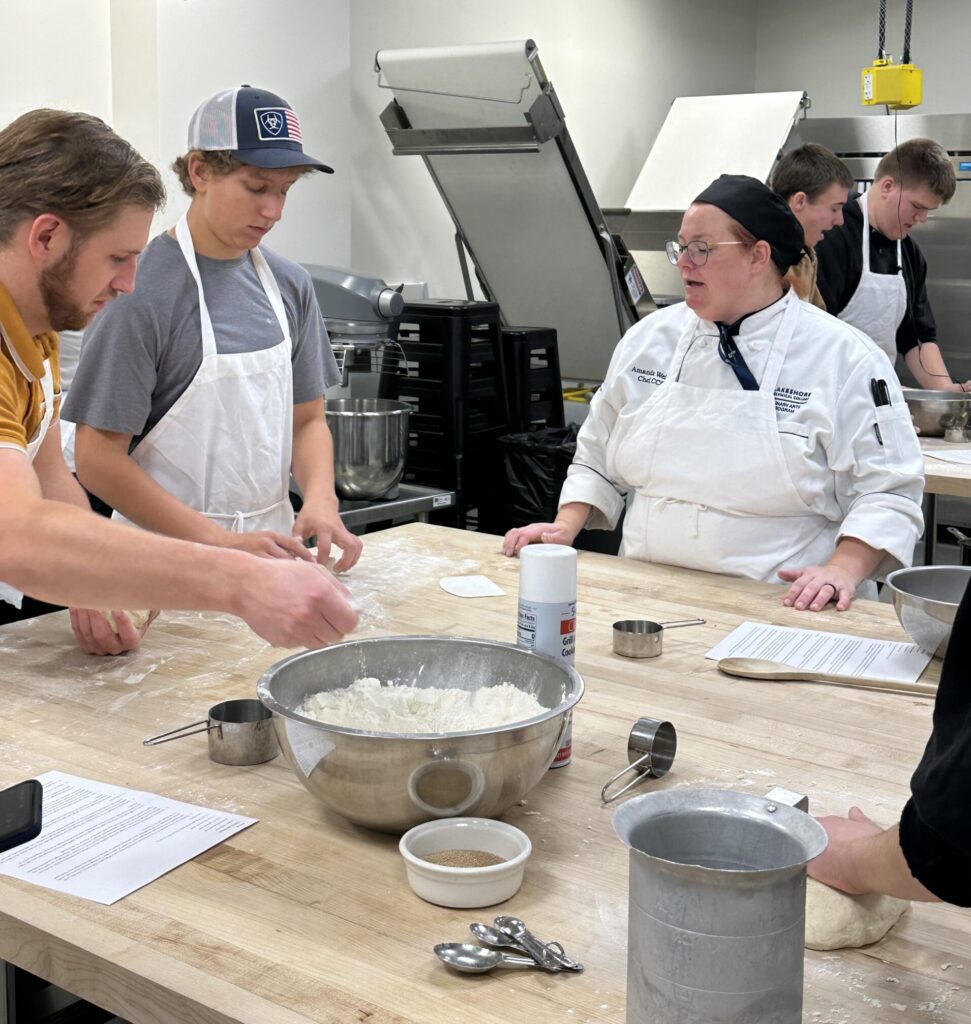
October 20, 2025
CLEVELAND – Amanda Weber doesn’t just teach hospitality – she embodies it.
The Lakeshore College program coordinator and instructor has been named one of the “Top 20 Women in Hospitality to Watch” by the Wisconsin Restaurant Association, a statewide honor recognizing standout leaders in the industry.
Weber, who was nominated by a colleague, will be recognized during a statewide conference in Madison this month.
“It’s an honor to be recognized along with so many talented women in the industry,” she said. “[An award like this] recognizes those who have helped me grow and strengthen my own expertise in addition to all of the education along the way, as well as community partners that I work alongside.”
Weber said she has been immersed in the hospitality industry since her teen years.
“I really fell in love with it, the energy, the team, the teamwork, the feeling of family,” she said. “You go through stressful situations with your coworkers [and come out stronger]. Also, [there are many] different paths and areas you can go into.”
A passion rooted in experience
Weber said her journey in hospitality began humbly – as a dishwasher – and she worked her way up within that very same kitchen.
“I went to the Culinary Institute of America, which is widely regarded as one of the best culinary schools in the country,” she said. “There are a lot of things I liked about my time there. There were some things I didn’t like about my time there. But [one thing I knew] is I really loved the kitchen. I really love that space.”
Weber said she eventually discovered where her true passion lies – not just in doing the work, but in leading and teaching others.
“The thing I really gravitated toward was managerial leadership roles,” she said. “That’s just my personality. I leaned into the education side of it and the training as someone who really feeds on that learning. I love helping others come into their own passion for this industry.”
Weber said having a full-spectrum view of the hospitality industry has served her well throughout her 21-year career.
“I’ve had a mix of roles in hospitality: in the back of house, kitchen side and the front of house – both in serving and the managerial side,” she said. “My last position, before I moved into my current role, was actually a personal chef for almost two years under my own brand. That was very fun.”
Weber said every career has its pivotal moments – and for her, opening Arrosto Delicatessen in Sheboygan with her husband in June 2020 is near the top of the list.
“That was just [an] insane [time – with the COVID-19 pandemic],” she said. “We did a whole lot of things to make sure we were keeping within guidelines at that time. I was also six weeks postpartum with my first biological child, which was just a very scary time but also really rewarding. It was a combination of years of work.”
Discovering her true calling
After that, she transitioned into full-time education – a move Weber said felt like a natural next step.
She said she’s now in her eighth year as an instructor and has spent the last three years coordinating the program.
“I love the new semester,” she said. “It brings on new students and new opportunities. One of the things I love about my role as coordinator is I get to help grow the program and move things forward based on student feedback. That pipeline from student feedback to actual changes tends to have a lot of growth and road bumps, but I know I am fighting for students.”
Weber said becoming a chef involves both extensive technical experience and the successful achievement of a professional certification.
“[Being referred to as ‘chef’] goes hand in hand with how long you’ve been in the industry and how you view yourself,” she said. “I never started referring to myself as ‘chef’ until other people did.”

Weber said she is certified as a culinary educator through the American Culinary Federation, which also includes her distinction as a certified sous-chef.
The mentorship aspect of her career, she said, has also provided many pivotal moments.
“Watching my students become who they want to be, watching them become chefs, entrepreneurs and leaders in their own right is very rewarding,” she said. “And I get to see it all the time. I get to see the light-bulb moments. It breathes new energy into everything.”
Because students bring diverse experiences into the classroom, Weber said mentorship is about finding the right approach to inspire each individual.
“Our students come from their own unique situations,” she said. “No experiences are the same, which means they are going to react and act on different lessons in different ways.”
Weber said for her, mentorship is about discovering what helps each student connect with the material, uncovering “where their motivation lies and helping them figure it out.”
Weber said she often discusses with students how to balance work and life.
“We have a lot of discussions about work, life and families,” she said. “We talk about how food is what connects everyone, and that it’s the one thing we all have in common. I pose questions like, ‘What can you tell me about your experiences that connect you to this industry?’”
Weber said having conversations about resilience is crucial, both in the hospitality industry and in life.
“It’s so important to talk about when you get knocked down, when you fail, because we all do,” she said. “We have to look at it in a different light. We have to see that failure as learning. I think that resilience, especially in our industry, is so important, especially because there are such small margins of success.”
Though her students’ ages and life situations vary widely, Weber said their ability to adapt remains constant.
“In my current class, I have a student in their late 40s, I have a student who is 17 and everything in between,” she said. “I have a few single moms who are attending school, working and balancing all of that. The biggest change I have observed in my students over the years has been their willingness to adapt.”
Before the COVID-19 pandemic, Weber said many students seemed resistant to change – whether it was adopting new styles or integrating technology.
Weber said she’s seen a noticeable shift in student motivation in recent years.
“I think, right now, what I’ve seen is a huge shift in the willingness to take advantage of technology and jump in with both feet,” she said. “In the last couple of years, I have noticed an increase in the number of students who really care [about their school work], which is different.”
Weber said fewer students are attending college out of obligation – instead, more are enrolling with a clear sense of purpose and personal motivation.
It’s a shift, she said, that leads to stronger dedication in the classroom.
“It’s much more about ‘I’m doing this for me, because this is what I want,’” she said.
Redefining hospitality
Even as the industry changes, Weber said its focus on key benchmarks will remain strong.
“I think the industry is going to continue to work on a balance between innovation and authenticity,” she said. “I think there’s going to be a next generation of chefs who are going to redefine what hospitality means.”
Local sourcing, sustainability and workplace culture, Weber said, will be greater priorities than ever before.
As she continues to shape future industry professionals, Weber said she believes hospitality is less about luxurious presentation and more about how people feel.
“Dining out is a place for connection and a place to experience each other,” she said. “We experience the food, but how does the notion of luxury fit into the hospitality equation? Someone I used to work for would say, ‘Luxury is the absence of discomfort.’”
But Weber said luxury doesn’t have to be expensive.
“It doesn’t mean you have the newest or the best,” she said. “It means you are not experiencing discomfort during your time at the restaurant. It’s that all of your needs are being taken care of, and you can relax and have a great time.”
Hands-on learning
Weber said there are a number of initiatives she has spearheaded which the culinary department also focuses on – with food sustainability being among the top priorities.

“We built a [food sustainable] system in a couple of different ways over the last two years,” she said. “We manage our excess ingredients and food by taking that food from the labs and repurposing it into full meals for our students. These are all free of charge. We package and label everything to include allergy information, along with noting when it was packaged and best-buy dates. My students get to learn all of that.”
Weber said the college also partners with Nourish Farms, a teaching farm in Sheboygan Falls, to reinforce sustainable practices.
“They take all of our compost, which teaches our students what is compostable and what is not,” she said. “It’s just another one of those steps to being knowledgeable about what you waste, how you waste it and where it goes. Hopefully, we’re planting the seed here, and it continues to grow as our students get out into industry.”
Weber said Lakeshore College offers dual-credit programs, which allow students to earn both college and high school credits – giving them a head-start on their education.
“Students can come in and experience the program early on,” she said. “It helps spark that passion sooner, and it also helps them realize the industry may not be for them because that’s important, too.”
Supporting each other
Mental health, Weber said, is especially important in the hospitality industry, where chefs and staff often work long hours in high-pressure environments.
Having the skills to recognize and respond to mental health challenges, she said, can make a real difference in these fast-paced kitchens and dining rooms.
“I became certified in Mental Health First Aid in 2023, and then later that year, I became certified to teach,” she said. “I teach the course, Mental Health First Aid, which is through Mental Health America, as well as a couple of other organizations.”
Supporting mental well-being, Weber said, not only improves individual health but also fosters stronger, more resilient teams across the industry.
“[In our industry], our focus, so often, is on the customer and not enough on the people who we serve next to,” she said.
In hospitality, where the daily focus is on serving others, Weber said it’s equally important to pay attention to our colleagues – “how we are supporting them and how they are supporting us, because nothing gets done in hospitality in a silo.”
“Nothing is done on its own,” she said. “Oftentimes in today’s world, work becomes our community. We have to notice things and have the tools to know what to say.”
Which is why Weber said though being recognized by the Wisconsin Restaurant Association as a “Top 20 Women in Hospitality to Watch,” is “wonderful – they show a lot of appreciation, but they don’t tell someone’s full story. “
“They also don’t recognize the people behind that person,” she said. “And for myself, personally, this award did not happen because of me alone. The recognition also needs to be placed on the many people who contributed to my journey. Nothing gets done alone.”
 Forest Lake Country Store undergoes rebrand
Forest Lake Country Store undergoes rebrand ‘Reclaiming’ Grand Avenue through retail
‘Reclaiming’ Grand Avenue through retail








